- Home
- Shannon Hale
Palace of Stone Page 15
Palace of Stone Read online
Page 15
They did not fire yet, as if the shooters, like Miri, were too astonished to act. What was this princess in white running to?
And then Miri noticed what she had not before. A boy, perhaps two years old, was standing in the courtyard, his head tilted up as he stared at the palace. His back was to the carriage. The horses pranced and shook, and the jolting carriage was backing up, its metal-rimmed wheels now inches from the child.
In full run, Britta grabbed the boy, and they tumbled onto the stones, rolling away from the carriage. The next moment its wheels lurched over the spot where he’d been.
The crowd stopped shouting. Miri was certain that they, like her, had not noticed the child before. The only sound now was one wailing voice. Miri looked for the source—a woman, her arms extended through the bars toward the child. His mother, surely. Perhaps she’d been screaming for help all along, Miri realized; only who could hear the cries of a mother above the calls of a mob?
Britta stood slowly, as if her fall had hurt and she was testing her limbs. The boy seemed dazed as Britta patted his arms and legs, searching for injury. He did not cry, but his eyes were wide and his chin tense, his breathing visibly rattling his chest. She picked him up and took him to the gate, where he fit back through the bars he must have climbed through. He reached for his mother, and she held him and buried his face in her neck. In the silence, Miri could hear the exhausted sobs of the woman as she said, “Thank you, thank you.”
The crowd parted for her, and the woman carried her son away.
All now was silent. Britta stood alone in her marriage gown, touching distance from an armed mob who’d threatened to cut her skin into ribbons. It would be useless to run, Miri knew. If they wished to kill Britta, they could.
Britta faced them, her hands clasped behind her back, her shoulders rising and falling as she breathed.
“They’ll shoot her,” Steffan said, his voice raspy.
“Wait,” Miri whispered. Offer silence, she thought.
Britta met the gaze of the crowd. The crowd looked back. A couple of the muskets lowered.
“Why doesn’t she come back?” Steffan said.
“She’s too scared to move,” Miri said, and her heart ached.
Steffan started, but the king held him still. Miri put a staying hand on Steffan’s arm.
“Not you,” she said. “Not yet.”
Miri took a step forward.
“Miri,” said Peder.
“I can do this,” she said.
The walk seemed eternal. How had Britta run this length so quickly? Miri’s breath tangled in her chest, and she could manage only short gasps. The horses had calmed in the silence, but Miri skirted the carriage just in case. There was something on the ground up ahead, and as she drew nearer she recognized Britta’s gray slippers. They must have fallen off as she ran. Miri picked them up.
She joined Britta at the gate. The fall had shredded some of the lace of her gown and dusted her with dirt. Miri pried one of Britta’s hands loose from the other and held her cold fingers. She could feel Britta shaking.
Fix this, Miri, she thought.
She straightened her shoulders and lifted her head.
“I am Miri of Mount Eskel,” she said in a loud, clear voice. “I wrote ‘The Mountain Girl’s Lament.’” Or most of it, she thought. She wanted to explain that she had not written that final paragraph, and to tell them how she loved Britta, and that it was not merely chance that Britta had noticed the boy when no one else had because she always saw, really saw people, and cared about them sincerely, and why a girl was more important than a painting. But the crowd was large and deep. Her voice could not reach them all.
Be as succinct as possible, Master Filippus had taught of Rhetoric.
She needed to say something that carried great meaning in only a few words. Like a song. Like a poem.
She still had Britta’s slippers. She held them aloft and shouted, “Look! The princess is shoeless!”
The crowd stirred. Some pointed to Britta’s bare, dusty foot peeking from beneath the hem of her dress.
“The princess is shoeless,” a woman repeated.
Others picked up the phrase. And though they had just been shouting for her death, the mob tossed the phrase around with awe and excitement: the princess is shoeless, the princess is shoeless …. Miri shivered with the sound.
“Come on, Britta,” she whispered. “I’ll walk you back.”
Squeezing her hand, Miri walked and Britta followed. The return seemed even longer. All it would take was one musket, one pistol, one person who did not care that Britta had saved that child, or perhaps had been too far back in the crowd to see. One bullet would end this. But neither ran, and when they reached the royal group, no shot had fired.
Steffan rushed forward to meet them, pulling Britta into his arms.
“You are so brave,” he whispered. “Too brave.”
She shook her head but did not let go.
“Inside,” said the king.
The group followed him through the door and down the wide central corridor. It was deserted.
“Your Majesty,” Miri said, trying to keep pace beside him. “Please don’t cancel their wedding. Every person who was at that gate feels differently toward Britta now. And those people will talk. People always talk. Word of what happened will pass around the city—”
“Perhaps. But what of the rest of us? The shoed?” he added fiercely. “Curse the lot. Gummonth was right. I should have sent troops into each province after their disrespectful gifts. I should have raised tributes and doubled the army. They will feel the wrath of the crown.”
Miri was not so sure it was a terrific peacemaking idea but did not dare point that out.
Far down the corridor, the Mount Eskel girls rushed by. Miri called to them and they hurried over.
“Where have you been?” she asked.
“We slept in the library last night,” said Gerti. “It was Liana’s idea.”
Liana flushed and mumbled that she had thought it would be fun. It seemed like a strange suggestion to Miri but she did not have time to think it over.
“There are people in the south wing,” said Katar. “They broke some windows.”
Not everyone had seen Britta’s actions in the courtyard. Miri believed the news would spread, but only if it had time.
In the distance, shouts echoed against stone.
The king directed them all to a chamber in the center of the palace. There were no windows—just four solid linder walls and one thick wooden door, reinforced with metal bands.
Peder and Frid shut the door behind them and lowered the heavy locking bars.
“Wait, where are we?” Liana said.
“A refuge room,” said Steffan.
“I’m not supposed to be in here,” she said, pacing near the door.
Miri thought it an odd comment but supposed Liana was just in a panic. Miri helped Britta and Steffan light the kerosene lamps around the room, filling the space with a twitching brightness. The queen slumped down on one of the many chairs. The academy girls began sorting through crates of supplies—jugs of water, blankets, jars of kerosene, tins of sailor biscuits.
Bena sniffed one of the hard biscuits that were made to last weeks at sea. “Just how long are we planning to stay here?”
“No longer than necessary,” said the king. “The royal guard will rally and free us.”
Britta was backing toward the far corner, where a doorless closet waited, so deep Miri could not see past its first shadow. Miri wondered if it held more food storage or perhaps a privy. She glanced back at the door just in time to see Liana trying to lift one of the bars.
“Don’t you dare open that door, Liana,” said Miri.
“I’m not!” she said angrily, and then mumbled, “The bars are too heavy anyway.”
Miri forgot the closet and watched the door instead, as if her vigilance alone would keep danger out. The threat seemed to lurk outside, so she never thought to turn a
nd look behind her. Not until she heard Britta’s strangled scream.
Chapter Eighteen
When the mountain quaked
Like an elbow’s nudge
Like a shout that something is wrong
The people woke and
Knew, yes, knew, that bandits had come
Three men stormed out of the closet, each holding a musket or pistol with a spare tucked in his belt. The scuffle was quick. A bearded man grabbed Britta. A second moved toward Steffan and the king. Frid was there, and she punched him in the face. The man fell backward, his pistol firing at the ceiling. Frid, Steffan, and Peder started toward Britta.
The third shouted, “Hold or we shoot!”
Everyone stopped. The bearded man was pressing a pistol to Britta’s temple.
“Hear us out, ignoble king,” he said. “Hear us or the robber princess dies! Death to all who grind the shoeless into the dirt. Now is the time for the people to take power.”
On he shouted, eager to share his ideas about a new age for the kingdom. His audience was captive. His captive was trembling. His friends were armed, and the royal party was powerless to do anything but listen. He was clearly a shoeless Aslandian, and not the assassin from Rilamark.
Britta did not cry, just bowed her head as if resigned.
“Reason with them,” Miri whispered to the king. “Please. If they were here for blood alone, they would have shot her immediately. Perhaps they only want to be heard.”
“They will not listen to me.” The king gestured wildly. “I’ve never felt so much hate.”
The queen nodded, a hand pressed to her stomach.
Miri frowned. It was easy to assume such people hated royalty, but the king sounded so sure. And then Steffan, tense and shaking, said, “He’s going to shoot her. He feels no remorse. He’s … no, please—”
Steffan did not seem able to stop himself. He lurched for Britta and the bearded man, but the second man, recovered from his blow, got in the way. He struck Steffan with the butt of a musket. The prince fell. The rebel held him down, the musket pressing against Steffan’s neck.
Britta jolted as if to go to him, but the bearded man held her tight and continued talking. She gripped his arms, too weak to pull them away. She looked up, her lip trembling as if she were preparing for the moment her soul would leave her body and drift into the heavens. Then she closed her eyes. With a sharp click, the bearded man paused his rant to cock the pistol.
No, Miri quarry-spoke, almost without thinking.
It was one fierce, defined, powerful idea. It was the mathematical concept of “not true” formed into emotion. She was not conscious of any particular memory that drove that idea down into the linder. The word was enough on its own. Mount Eskel’s linder understood no. She detected the faintest shift under her feet, and remembered Esa’s violent quarry-shouts from the palace library and how the stone had vibrated then.
Those of Mount Eskel looked Miri’s way, hearing her quarry-speech. The bearded man lectured on, his finger twitching on the pistol’s trigger. He was going to kill Britta, Miri now had no doubt. She had once been caught and held by such a man, a bandit who wanted her dead. Miri’s pa, big as a boulder and strong as a bear, had come to help her. Britta’s father would not come.
He doesn’t matter, Miri thought. Britta is one of us now. We’re her ladies.
Miri quarry-spoke the memory of becoming ladies of the princess, a moment all the girls shared. They turned to Miri, understanding, coming in closer. They were Britta’s ladies. They would stand beside her.
All came but Liana, who stayed crouched behind a sofa. Though they shared the memory, Liana’s feelings about it must have been quite different. She felt no attachment to Britta, only bitterness that she had not been chosen herself.
Just like Sisela, Miri realized.
The man was still shouting. Miri quarry-spoke the memory of that frightening night in winter when bandits had come to the academy. Of standing by the window, looking out toward the faraway village, and hoping that their families would know they were in trouble and come to help. With the memory she hoped to communicate When there is danger, the people of Mount Eskel hear.
And then she spoke aloud. “We of Mount Eskel—” Her mouth was as dry as a fallen leaf. She swallowed nothing and tried again. “We Eskelites have something to say.”
The ranting went on, so she repeated herself, louder this time. The man quieted.
“We girls want a chance to speak before justice is decided. We who were chosen by divination to attend the sacred academy. We who took Britta in, not knowing who she was. We want to speak.”
The bearded man nodded, and the man beside him said, “Speak, little sister.”
“Don’t shoot anyone yet. Please give us a chance to make our case first.”
“Speak the crimes of the false princess,” said the bearded man. “We’ll give her a trial here and now.”
Miri took a shuddering breath. If she said the wrong thing, Britta would be shot. And perhaps the royal family as well, or even she herself. If she told them that Britta was kind and patient and loving, would that be enough?
The queen was beside her. She touched Miri’s arm and whispered, “I think they are afraid. They hate, but they fear too.”
Miri nodded. A rule of Rhetoric advised: Speak in a language the listener understands. These men were too angry just then to hear pleas for compassion, but fear they would understand. Despite their bravado, they must have hoped to escape with their lives. So she would tell them the story.
“There is a tale we repeat each year during our spring holiday,” said Miri. “One lifetime ago bandits came to Mount Eskel.”
Katar smiled, her dimples making a rare appearance. She took a turn with the telling, as was the custom on Mount Eskel. “They thought to sack such a small village easily enough. They thought they could steal, burn, and be gone before the sun saw their deeds. But they were ignorant, tiny men. They did not know Mount Eskel’s secrets.”
“The mountain knows the feel of an outsider’s boot, and the mountain will not support its weight,” said Esa. She moved ahead to the middle of the story, just as she had two years before when they’d told this story to the bandits who’d come to their academy. Only this time her voice did not quaver.
“The bandits came nearer and nearer, and the mountain groaned in the night,” said Bena in her bright, confident voice. “It groaned, and the villagers heard and awoke. They were waiting—with mallets and chisels and levers, they waited.”
Miri noticed Frid lift her head as if to speak, then stop herself. Given her fist’s recent encounter with a rebel’s face, Miri thought her wise to keep silent.
Gerti’s voice was soft, but her words flowed like the music of her lute. “That night, the quarriers stood taller than trees, taller than mountains, and they struck like lightning. When the first bandits fell, the rest ran. They ran like hares from a hawk.”
“Mount Eskel feels the boots of outsiders,” Miri said, speaking the final words of the story. The other girls joined in unison. “Mount Eskel won’t bear their weight.”
There was not a sound in the chamber. Every face watched the girls.
“We told this story to the bandits who claimed the princess academy as their plunder,” said Miri. “They were afraid, but not enough to let us go.”
“In the end,” said Katar, “they learned what it costs to ignore villagers who live on that ancient mountain.”
Gerti sang a line from a song—“Mount Eskel, My Lady.” The tune made Miri’s throat tighten with emotion, and for a moment she could not speak. Esa spoke for her.
“My ma says a rock lasts forever, but people don’t, and that’s what makes them more precious.”
That’s true, Miri thought, and wondered why she had never come across the idea in Master Filippus’s books.
She reclaimed her voice and continued. “Mount Eskel is older than any kingdom. This palace is built of linder cut from the slopes of our home.
Mount Eskel remembers its own. And we of Mount Eskel claim Britta as one of our own.”
Silence followed. The bearded rebel tilted his head, as if that was not the ending he’d been expecting.
Miri repeated herself. “We claim Britta as our own. She no longer belongs to Lonway or her dishonorable father. A person belongs to those she loves and those who love her back. She belongs to us. And she did not steal from us the right to be princess.” Miri made eye contact with the other Eskelites around her to include them in her words, and then turned back to again face the man with the pistol. “We gave it to her.”
Britta’s body was trembling as if every part of her was profoundly aware of that pistol to her head. But her eyes met Miri’s and her lips managed a small, grateful smile.
The bearded man was shaking his head. He seemed confused that Miri did not agree with him.
“Death to the robber princess,” he said, his voice less sure now yet edged with anger.
He adjusted his hold on the pistol, his finger pressing lightly on the trigger. White-hot panic charged through Miri.
“You will not harm her!” she shouted.
“My son is sick, my children hungry,” said the man. “And she’s to blame, the lying wench!”
Miri wrestled calmness into her voice. “I’m sorry, but you cannot harm Britta. Her mountain will not stand for it.”
She did not know quite what she meant, only that it felt true.
“I will do as I like,” said the man, his voice hard as a bullet.
Miri felt that word rush through her again—no.
She stamped her foot in the rhythm of a quarry work song, speaking no, no in time. The other girls and Peder took up the quarry-spoken chant, their voices weaving together, strong as an iron lever.
No. Miri let that word pound out of her, through the stone, toward the bearded man with the gun. There was a sound like a faraway shriek, and the floor started to crack. Some of those in the room startled or gasped, but the Eskelites kept working the quarry-speech into the stone.
No. She spoke not through but to the very stone. She sang memories of high windy peaks, of quakes that rose up from deep in the earth, of the hammering of mallets and the sweaty blows of the quarry workers. The stone remembered. And the stone rumbled in reply.

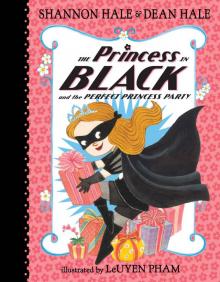 The Princess in Black and the Perfect Princess Party
The Princess in Black and the Perfect Princess Party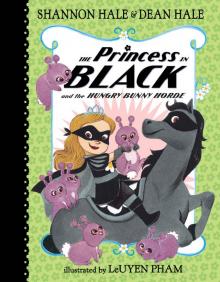 The Princess in Black and the Hungry Bunny Horde
The Princess in Black and the Hungry Bunny Horde The Unfairest of Them All
The Unfairest of Them All Forest Born
Forest Born 2 Fuzzy, 2 Furious
2 Fuzzy, 2 Furious The Actor and the Housewife
The Actor and the Housewife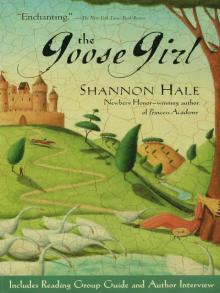 The Goose Girl
The Goose Girl Palace of Stone
Palace of Stone Midnight in Austenland
Midnight in Austenland Enna Burning
Enna Burning Dangerous
Dangerous The Storybook of Legends
The Storybook of Legends Princess Academy
Princess Academy Austenland
Austenland The Forgotten Sisters
The Forgotten Sisters The Unbeatable Squirrel Girl: Squirrel Meets World
The Unbeatable Squirrel Girl: Squirrel Meets World Book of a Thousand Days
Book of a Thousand Days Fire and Ice
Fire and Ice The Princess in Black Takes a Vacation
The Princess in Black Takes a Vacation River Secrets
River Secrets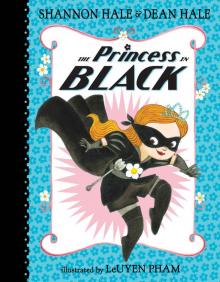 The Princess in Black
The Princess in Black Books of Bayern Series Bundle
Books of Bayern Series Bundle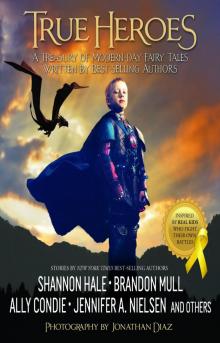 True Heroes
True Heroes Austenland: A Novel
Austenland: A Novel The Princess in Black and the Science Fair Scare
The Princess in Black and the Science Fair Scare![[Bayern 02] - Enna Burning Read online](http://i1.bookreadfree.com/i1/04/02/bayern_02_-_enna_burning_preview.jpg) [Bayern 02] - Enna Burning
[Bayern 02] - Enna Burning Ever After High
Ever After High Monster High/Ever After High--The Legend of Shadow High
Monster High/Ever After High--The Legend of Shadow High